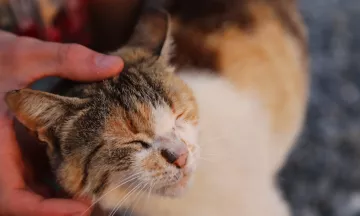You do everything you can to keep your cat happy and healthy - but at some point, just like us humans, your cat might get sick. Or adventurous cats sometimes get themselves into trouble and suffer an injury. It's therefore really important that all cat owners and cat sitters can spot symptoms of illness or injury in a cat. What should you as a cat owner or cat sitter do in case of an emergency? How do you perform first aid on a cat? These are our emergency cat care tips:
How do you recognise a sick or injured cat?
To recognise when a cat is sick or in pain, you need to know what a healthy, happy cat looks like. A healthy cat is active, with clear, bright eyes, a good appetite, is pooping and peeing normally, has smooth fur and clean skin. A happy cat moves with comfort and grace, and breathes without any strange noises. If there is a sudden change in one or several of these areas, it may be a sign that the cat is ill or in pain. Read more about the symptoms of a sick cat here.
If you recognise symptoms of illness or pain, consult your vet. But what should you do before you go to the vet? In case of accident or illness:
First aid after an accident
Cats can be quite the daredevils. And although they supposedly have nine lives, an accident can always be just around the corner. We recommend you keep your cat indoors if you possibly can, but should an unfortunate jump or incident occur, keep an eye out for the following injuries:
- Limping, difficulty moving
- Pain when touched or petted
- Wounds: swelling or fluid in the affected area, bleeding
- Difficulty in breathing, cardiac arrest
Are there any open wounds visible? To prevent infection, clean the wound with a saline solution. Does the cat continue to lick the wound? Gently wrap a clean bandage or piece of cloth to prevent the cat from hurting itself further. In the case of a burn: cool for at least 10 minutes with cold running water before taking the cat to the vet.

Unfortunately, it can also happen that you have to deal with a badly injured cat, for example, after a traffic accident - yet another reason it's a good idea to keep your cat in a safe, enclosed space away from traffic and busy streets. Should the worst happen, immediately call a pet ambulance or veterinarian, or jump in a car or taxi to take the cat to emergency care. The cat may be in severe pain and be anxious, so be careful and use gloves, blankets or a soft towel to prevent the cat from biting or scratching you. Talk gently to the cat in order to put him or her at ease.
Provide first aid and CPR on the cat if you have training in this:
- Stay calm and make sure the environment is safe for both the cat and yourself
- Don't move the cat, but put it gently on it's side
- Try to stop severe bleeding with a clean cloth
- Gently open the mouth and make sure the airways are clear
- If the injury is serious: don't give the cat anything to eat or drink
- Has the breathing or pulse stopped? Then provide CPR: compress the chest 15 times per 10 seconds, give a breath every 10 compressions. Read the guide to cat CPR here
First aid in case of illness
Your cat might feel a bit under the weather at some point and not all symptoms are a reason to worry too much. For example, throwing up doesn't have to be a symptom of a serious condition at all: it can just be a hairball or indigestion. In order to recognize the more serious symptoms, observe your cat when he or she is in a healthy cat state so that you can spot a change in behaviour or appearance. Are you a cat sitter with a reservation coming up? Make sure you arrange a thorough meet & greet beforehand so that you know how the cat behaves normally. Ask the owner to tell you everything there is to know about the cat so you're already in the loop.
Very common symptoms in case of illness are:
- Difficulty breathing
- Coughing up phlegm
- Fluid from the eyes and nose
- Constantly scratching and licking
- Vomiting or diarrhoea
- Difficulty urinating / little urination
- Sudden lack of self-cleaning or smelliness
- Sudden drowsiness, lethargy or paralysis
- Weight loss or sudden weight gain
These symptoms can indicate many conditions and it is important to call the vet if they show up. In the meantime: provide cat care by:
- Staying calm
- Making sure to keep the cat a comfortable temperature: provide some blankets if it's cool, or shade if it's hot
- Providing a quiet, dark place without other pets or children around
- Making sure there is sufficient water available, especially in case of diarrhoea. If the cat doesn't drink, provide wet food
- Clean your cat's dirty nose, eyes or backside with clean, damp cotton wool
What should I as a pet sitter do in case of emergency?
If you are a pet sitter, it might happen that a cat or dog gets sick or injured while under your care. Therefore, good preparation is essential. Make sure to ask for the pet's medical information and the contact details of the vet beforehand. Make sure you have a travel carrier handy and a first aid kit. In that, you will find things such as clean bandages, cotton wool, saline solution, ointment for wounds and a thermometer.
If you observe any symptoms of illness in the cat or spot any signs that it's injured, always inform the pet owner, for example via the Pawshake app. Please make sure not to panic or cause the owner too much worry. Just calmly tell them what you have observed and share your concerns. Maybe the owner can provide you with some useful information because they know their cat best. Explain to the owner what your next steps will be.
Can't reach the owner? Make sure to take action anyway - the safety and health of the pet is always, always the top priority. Provide first aid and call the vet. With every Pawshake booking, the pet is covered in the event of sudden illness or accidents, so always ask the vet for a receipt.
Do you have any questions or doubts about what to do in case of emergency? Take a breath and stay calm. Feel free to contact Pawshake customer service at any time, our employees are ready to help you out every day!






